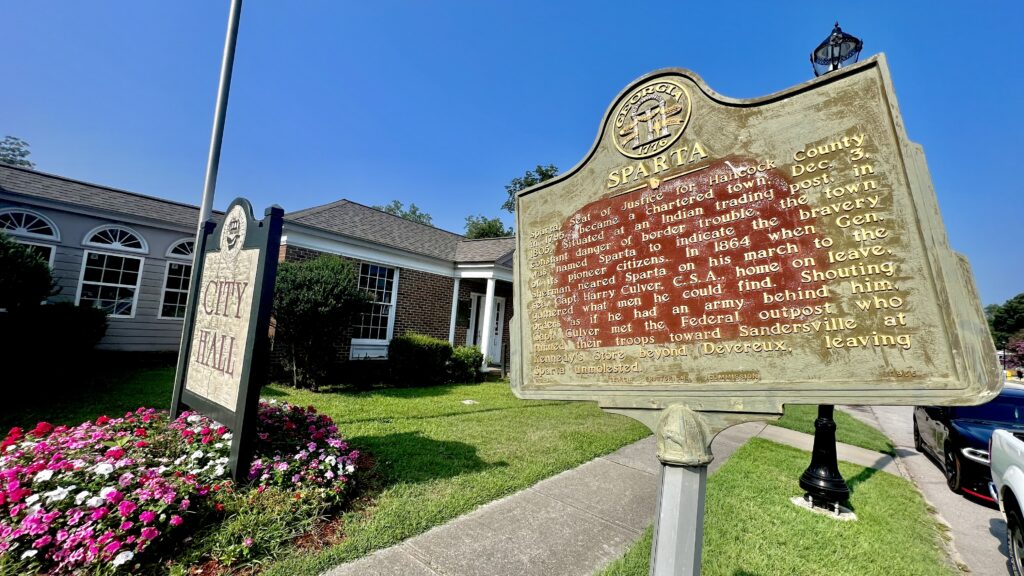
For roughly 100 years, Blaine Smith and members of his extended family in Sparta have owned and farmed nearly 500 acres of land, which they say is now threatened by a powerful railroad firm.
The Sandersville Railroad Company wants to construct a 4.5-mile-long rail spur to cross through Smith’s land as well as neighboring families’ properties.
The railroad company’s method to make that happen: eminent domain.
This, so a private company can haul 500,000 additional tons of materials — most likely granite — from the nearby Hanson Quarry every year.
For the interested parties as well as outside observers, this legal tug-of-war is a classic example of the tension between private property rights and a development tool that was enshrined in the U.S. Constitution – and has been producing controversies ever since.
Eminent domain gives the government the power to take your property, even if you don’t want to sell. The Fifth Amendment restricts eminent domain in two ways. First, the entity that takes the land must have a public use for it, such as roads or bridges. Second, property owners must receive just compensation.
In 2005, the U.S. Supreme Court’s decision in the Kelo v. New London case expanded the definition of “public use” to include private economic development. The following year Georgia state legislators passed a new law that countered the Supreme Court’s decision. In the Peach State, economic development is not a public use that justifies the use of eminent domain.
Sandersville Railroad offered Smith an undisclosed sum of money to use his family land.
Smith refused. Instead, he opted to take the case to the legal system. A hearing officer for the Georgia Public Service Commission (PSC) is scheduled to try to resolve the conflict later this year.
“My grandfather was a farmer and raised vegetables and corn and cotton worked on our land his whole life. My father came back from World War II and lived and worked there for more than 40 years,” Smith said.
“I can’t put any value on that land because it is priceless to us. Each member of our family who held that property has used it for raising timber and for their personal enjoyment. We have our ponds there. We fish there.”
Blaine’s wife, Diane, said one of her sons wants to plant a grape orchard there. Other members of the family want to grow apple trees and peach trees.
“That won’t happen with the train coming through the land right smack dab,” Diane Smith said.
“If we want to do some farming in the future then that is clearly going to be diminished.”
A PROMISE
According to the U.S. Department of Agriculture, only 1.4% of the nation’s 3.4 million farmers are black. Diane Smith said she, her husband and their family are among a dwindling number of the area’s black farmers.
Years ago, Blaine Smith made a promise.
“I told my father we’d keep this land together,” Blaine Smith said.
“I’ll be damned if I let something like this go through there.”
Diane Smith said the family has owned the land for more than a century.
Nevertheless, Sandersville Railroad officials said the spur will supply badly needed jobs and money. And the company’s offer might easily attract the community at large.
Sparta is in Hancock County. The 2010 Census showed the county had 9,429 residents. The 2020 Census revealed that number had dropped to 8,387. Hancock, according to the 2020 Census, has a near 30% poverty rate.
A BLEAK SITUATION

Hancock in 1850 was Georgia’s wealthiest county and its second-most populated, said Sparta Mayor R. Allen Haywood.
“This was the center of agriculture. The soils here were perfect for a number of different crops,” Haywood said.
“Economically, we were in great shape until the late 1980s and early 1990s, when we lost 500 jobs.”
Many years ago, downtown Sparta thrived with mom and pop businesses. But the onset of corporate superstores — now located in surrounding counties — killed downtown, Haywood said.
On a Tuesday at noon, one can find a handful of parked cars, but downtown otherwise looks deserted.
Someone from the Sparta-Hancock Chamber of Commerce posted a sign on a tree that says “Shop Local.” Several feet away is a closed and boarded-up beauty supply shop. The doors are padlocked.
A pharmacy is open, as is a barbershop. Many other businesses are closed permanently.

Inside the barbershop, Keith Tobias said Sparta spelled backward is ‘a trap.’
Barber Rahann Williams said the county needs any new opportunities to put more jobs and more money into the community.
But opinions vary.
Travel up Shoals Road, where the Hanson Quarry and many nearby homes are. With some rare exceptions, almost all the homeowners have posted yard signs that read “No Railroad in Our Community.”
A CONVENIENCE? OR AN INCONVENIENCE?
Sandersville Railroad spokeswoman Vivian Lee-Boulton said the spur and the proposed eminent domain will not force anyone out of their home. She also said it will not prevent property owners from timbering their property or using their pastures or hunting areas.
Company officials said the train in question will make one round trip daily, traveling at fewer than 20 mph, between the CSX line and the Hanson Aggregates Quarry during normal business hours.
Hanson will install berms 130 feet wide and 20 feet tall to minimize noise. Sandersville Railroad President Ben J. Tarbutton III said the spur is a quarter of a mile to half a mile away from most homes. But as the spur advances closer to the quarry, it will move closer to certain houses, he added.
Tarbutton said the spur would get within about 500 feet of three homes, although an attorney for one of the families said one home is only 200 feet away. Tarbutton said that at 200 feet the train would create roughly 70 decibels. According to the DecibelPro app, that’s as loud as a washing machine, a dishwasher or the inside of an automobile driving at 60 mph.
WHAT HAPPENS ONCE THE SPUR IS BUILT

Once rail service is established, Hanson will expand that quarry and move its operations into the back of these berms, further away from homes, Tarbutton said.
“That will be an incredibly better situation in terms of noise. The main plants will be behind these earthen berms, and so will most of the railroad track,” Tarbutton said.
“We have really worked hard to try to make this as friendly as possible and still get the project done.”
Tarbutton also said the affected property owners will have a gate crossing that allows them to access the back portions of their properties.
To that, Institute for Justice attorney Betsy Sanz said the following:
“Who cares!”
IJ is a nonprofit public-interest law firm based in Arlington, Va., that is representing the Smiths and another affected couple, Don and Sally Garrett. According to IJ, the Garretts have owned their property since the 1800s.
“The company doesn’t have to show that it’s conveniencing the property owners,” Sanz said.
“They must show this is a public use. Saying they won’t be inconvenienced doesn’t factor into this not being a public use. That is what they have a burden to show, and that is what the Georgia Public Service Commission must find.”
Another IJ attorney, Renée D. Flaherty, said Sandersville Railroad wants to use 2.11 acres of the Garretts’ property.
“It will probably be similar for the other properties,” Flaherty said.
Of the Smith family’s 500 acres, Blaine and Diane Smith hold three parcels of 55 to 63 acres. The proposed railroad spur route basically cuts two of those in half and cuts through the top third of the other.
The Smiths were asked if the spur would go through uncultivated land or if it would cause them to lose certain crops.
Diane Smith would only say that she and her husband raise certain crops and trees at the property, but she did not elaborate.
Tarbutton, however, said the spur would not disrupt any of the Smiths’ forestry activities.
JOBS AND INCOME

IJ argues that a government may legally use eminent domain to build something that benefits the public, such as a highway, but not for something that benefits only a private company.
After Kelo, a lot of states updated their eminent domain laws, including Georgia.
“The Supreme Court’s 5-4 decision against Kelo and her neighbors sparked a nation-wide backlash against eminent domain abuse, leading eight state supreme courts and 43 state legislatures to strengthen protections for property rights,” according to IJ’s website.
As stated earlier, per Georgia law, economic development or increasing the tax base is not a justifiable reason to take someone’s private property.
According to Sandersville Railroad’s website, the rail spur and expansion will create 12 new jobs that pay, on average, $90,000 per year in salary and benefits. The project is supposed to deliver $1.5 million in annual direct economic impacts to Hancock County.
Tarbutton said the county supplies granite to the rest of the United States. The nation needs granite for roads and bridges, he said, due to the recent federal Infrastructure Investment and Jobs Act.
REIMBURSEMENT?
Tarbutton said that “through a very detailed process,” his company made offers on every desired parcel of land and — except for the Smiths’ and the Garretts’ — purchased several tracts.
“We feel like we listened to their concerns. We made changes to the route,” Tarbutton said.
“Whatever we do other than not building, it will not appease the opposition.”
Diane Smith, however, said that the proposed reimbursement money — if she and other members of her family were even willing to accept it in the first place — is inadequate.
“Everybody is not about dollars,” Diane Smith said.
Tarbutton said the railroad’s appraisers use “a very methodical process” to offer a fair market value to every landowner.
“The landowner makes a counter-offer,” Tarbutton said, adding he did not know the original offer.
“We have not heard back from the Smiths.”
THE GEORGIA PUBLIC SERVICE COMMISSION
Sanz said members of the Georgia PSC have scheduled a hearing for Nov. 27 and 28 of this year. There, IJ attorneys will question members of the railroad.
Sanz said IJ will argue that what Sandersville Railroad wants to do with the land does not constitute a public use.
Hearing Officer Nancy Gibson will listen as both sides make their case, said PSC spokesman Tom Krause.
Gibson will then issue an initial decision, said PSC Executive Director Reece McAlister.
“The hearing officer conducts the case. Testimony is filed. A cross-examination will take place. Witnesses will be called. Then they will have a full evidentiary hearing,” McAlister said.
“The hearing officer will make a recommendation. It will then go before the full commission to either accept the hearing officer’s recommended decision, or they can go in a totally different direction.”
Sanz said if one of the two parties dislikes the hearing officer’s decision, or — later — the full PSC’s, then they may appeal the matter. The case would next go to the Superior Courts of Georgia and then potentially through the state’s appellate courts. There also remains the possibility that the parties will reach a settlement.
A NEUTRAL PERSPECTIVE
Atlanta-based eminent domain attorney Christian Torgrimson said she has no direct involvement in this case but knows of it.
“Entities like the railroad are sort of a quasi-public-private entity,” Torgrimson said.
“They are a private enterprise but they serve a public need and a public use. It gives them the ability to use the eminent domain authority and condemnation procedure to achieve their project goals. For the railroad, that is obviously moving goods back and forth.”
The property owners have fewer opportunities to challenge the eminent domain from a legal and constitutional standpoint and then succeed, Torgrimson said.
“The Georgia Landowners’ Bill of Rights, passed after Kelo, does help clarify the process that the government or an entity needs to go through, but the law very heavily favors entities that have the right to use eminent domain. The law wants to assist the use of private property for the public good as long as there is compensation and compensation has to be paid first before that land can be taken,” Torgrimson said.
“As compelling as a family owned property for generations is, and how devastating it is to lose your home, unfortunately, that alone is not enough to prevent the exercise of eminent domain.”
Torgrimson said she “can count on one hand the number of times I have been successfully able to stop” an eminent domain project.
“[Challenging the process] does not stop it altogether,” Torgrimson said.
“It may alter it. It may require the entity to start all over again because of the right process under the Landowners’ Bill of Rights Act. It is very difficult to get it to go away completely and leave the property alone.”
‘ALL FARMERS SHOULD WORRY’
Tarbutton reiterated that Hancock County needs the jobs.
“There are many positives here,” Tarbutton said.
Blaine Smith, however, said this story should alarm all Georgia farmers.
“I already have enough trouble with hunters and people fishing on my property. We have kept them out by gating them out,” Blaine Smith said.
“Now I can’t even stop them because I have this entire corridor going through. All farmers should worry.”
